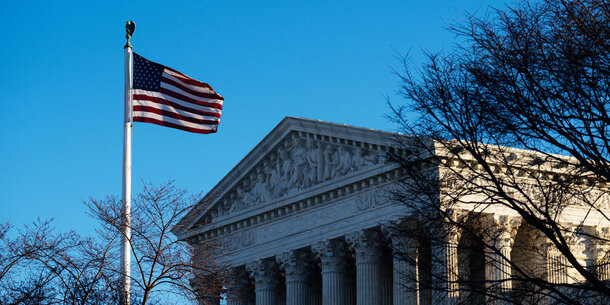In 2022, the Turtle Mountain Band of Chippewa Indians, Spirit Lake Tribe, and three Native American voters filed a federal lawsuit challenging North Dakota’s 2021 state legislative redistricting plan. The suit alleged that the plan unlawfully dilutes the voting strength of Native American voters, in violation of Section 2 of the Voting Rights Act (VRA).
Enacted in 1965, Section 2 of the VRA bans racial discrimination against voters. Beyond just the denial or abridgement of the right to cast a ballot, Section 2 also applies to discriminatory redistricting plans that dilute the voting power of minority voters.
Plaintiffs – represented by the Native American Rights Fund, Campaign Legal Center, Robins Kaplan LLP, and Law Office of Bryan L. Sells, LLC – sued North Dakota’s secretary of state under Section 2 of the VRA and Section 1983, a federal statute that allows individuals to sue state officials who violate their federally protected rights. In April 2022, the secretary filed a motion to dismiss, arguing that only the Department of Justice (DOJ), and not private parties like the plaintiffs, can sue for violations of Section 2. In May 2022, after the DOJ filed statement of interest that private parties can sue to enforce Section 2, the district court denied the secretary’s motion.
In November 2023, after a trial, the district court held North Dakota’s redistricting plan discriminates against Native voters, in violation of Section 2. The same month, the Eighth Circuit, in a separate case, embraced a fringe theory that Congress did not intend for private parties to sue under Section 2 of the VRA. That ruling, however, did not address Section 1983.
On May 14, 2025, a three-judge panel of the Eighth Circuit ruled private plaintiffs cannot sue to enforce Section 2 of the VRA through Section 1983 either.
Under the panel’s ruling, voters in the seven states covered by the Eighth Circuit (Arkansas, Iowa, Minnesota, Missouri, Nebraska, North Dakota, and South Dakota) cannot sue to stop violations of Section 2 of the VRA. The DOJ can still file Section 2 cases, but that alone is not enough to prevent voting discrimination in these states, which include significant Native communities who have, and continue to face, rampant discrimination in voting.
For decades, Congress, the courts, the DOJ, and private litigants have agreed that Section 2 of the VRA can be enforced by individual voters and groups. Historically, a majority of Section 2 cases have been brought by private parties, and DOJ attorneys have explained that the department relies on private lawsuits because it does not have the resources to bring all of these types of cases even if it wanted to. The current DOJ is also unlikely to bring Section 2 cases. Since January, the department has shed 70 percent of its Civil Rights Division staff, dismissed nearly all of its Section 2 cases, and shifted its focus to pursuing conspiracy theories about the 2020 general election.
On May 28, 2025, the plaintiffs asked the full Eighth Circuit to rehear the case.
On June 4, 2025, six amicus briefs were filed in support of the plaintiffs’ request, including a brief from Historians Council member Alexander Keyssar and three other voting rights historians, as well as a brief from 16 former DOJ attorneys who litigated cases to enforce Section 2 of the VRA.
On July 3, 2025, the Eighth Circuit denied the plaintiffs’ petition for the full court to rehear the case.
On July 15, 2025, the plaintiffs asked the Supreme Court to stay the Eighth Circuit’s decision pending their forthcoming petition for writ of certiorari.
On July 24, 2025, the Supreme Court granted plaintiffs’ request, restoring, at least temporarily, voters’ ability to go to court to challenge discriminatory voting policies under the VRA.
On September 2, 2025, plaintiffs filed their petition for a writ of certiorari.
District Court
- Plaintiffs’ Complaint (February 7, 2022)
- Statement of Interest of the United States (May 20, 2022)
- Order Denying Defendant’s Motion to Dismiss (July 7, 2022)
- Findings of Fact and Conclusions of Law (November 17, 2023)
Eighth Circuit (Three Judge Panel)
- Brief of Defendant-Appellant (January 30, 2024)
- Brief of Alabama and 14 Other States in support of Defendant-Appellant (February 7, 2024)
- Brief of Plaintiffs-Appellees (March 18, 2024)
- Brief of National Congress of American Indians in support of Plaintiffs-Appellees and Affirmance (March 22, 2024)
- Brief of Lawyers’ Committee for Civil Rights Under Law in support of Plaintiffs-Appellees (March 22, 2024)
- Brief of the United States in support of Plaintiffs-Appellees (March 25, 2024)
- Brief of the NAACP Legal Defense & Educational Fund in support of Plaintiffs-Appellees (March 26, 2024)
- Reply Brief of Defendant-Appellant (April 8, 2024)
- Panel Opinion (May 14, 2025)
Eighth Circuit (En Banc Petition)
- Plaintiffs-Appellees’ Petition for Rehearing En Banc (May 28, 2025)
- Brief of 16 Former DOJ Attorneys in support of Plaintiffs-Appellees’ Petition for Rehearing (June 4, 2025)
- Brief of National Congress of American Indians in support of Plaintiffs-Appellees’ Petition for Rehearing (June 4, 2025)
- Brief of NAACP Legal Defense & Educational Fund in support of Plaintiffs-Appellees’ Petition for Rehearing (June 4, 2025)
- Brief of NAACP Arkansas State Conference and Arkansas Public Policy Panel in support of Plaintiffs-Appellees’ Petition for Rehearing (June 4, 2025)
- Brief of Voting Rights Historians in support of Plaintiffs-Appellees’ Petition for Rehearing (June 4, 2025)
- Brief of Minnesota and 18 other states in support of Plaintiffs-Appellees’ Petition for Rehearing (June 4, 2025)
- Defendant-Appellant’s Response to Petition for Rehearing (June 16, 2025)
- Order Denying Plaintiffs-Appellees’ Petition for Rehearing (July 3, 2025)
- Plaintiffs-Appellees’ Motion to Stay the Issuance of the Mandate (July 9, 2025)
Supreme Court (Petition for Certiorari)
- Plaintiffs’ Emergency Application to Stay the Eighth Circuit’s Mandate Pending Petition for Writ of Certiorari (July 15, 2025)
- Administrative Stay (July 16, 2025)
- Brief of NAACP Legal Defense & Educational Fund in support of Plaintiffs’ Stay Request (July 21, 2025)
- Defendant’s Response to Plaintiffs’ Stay Request (July 22, 2025)
- Brief of Alabama and 14 other states in opposition to Plaintiffs’ Stay Request (July 22, 2025)
- Plaintiffs’ Reply in support of Stay Request (July 23, 2025)
- Order Granting Plaintiffs’ Stay Request (July 24, 2025)
- Plaintiffs’ Petition for a Writ of Certiorari (September 2, 2025)
- Defendant’s Brief in Opposition (September 19, 2025)
- Amicus Brief of American Jewish Committee in support of Plaintiffs (October 2, 2025)
- Plaintiffs’ Reply Brief (October 3, 2025)
- Amicus Brief of Ellen D. Katz and the Voting Rights Initiative in support of Plaintiffs (October 6, 2025)
- Amicus Brief of Former Republican Governors in support of Plaintiffs (October 6, 2025)
- Amicus Brief of Bipartisan Group of Current and Former Members of Congress in support of Plaintiffs (October 6, 2025)
- Amicus Brief of Minnesota, 21 other states, and the District of Columbia in support of Plaintiffs (October 6, 2025)
- Amicus Brief of Voting Rights Historians in support of Plaintiffs (October 6, 2025)
- Amicus Brief of AALDEF, AAJC, and LatinoJustice in support of Plaintiffs (October 6, 2025)
Related Blogs and Reports
- Andrew Garber, Appeals Court Strips Voters’ Ability to File Voting Rights Act Lawsuits in 7 States, May 29, 2025
- Gina Feliz, The Justice Department Is Shirking Its Responsibility to Voters, June 10, 2025

